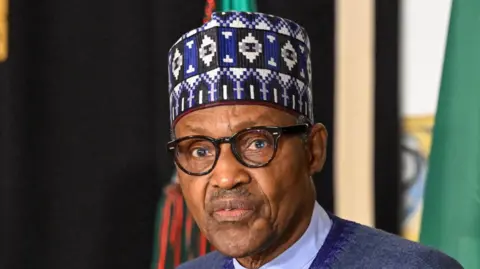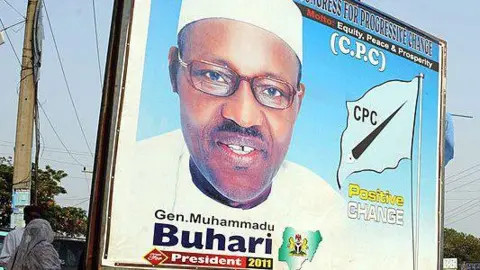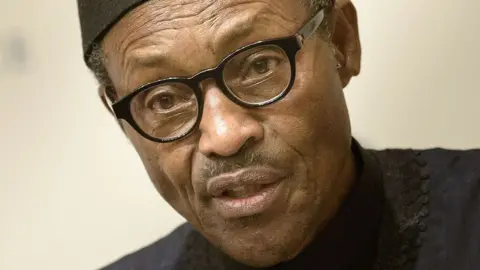Buhari - the austere Nigerian military ruler who defeated a sitting president
The cause of death was not disclosed but he had suffered from ill-health for many years.
Never a natural politician, he was seen as aloof and austere. But he retained a reputation for personal honesty - a rare feat for a politician in Nigeria.
After three failed attempts, Buhari achieved a historic victory in 2015, becoming the country's first opposition candidate to defeat an incumbent. In 2019, he was re-elected for another four-year term.
Buhari had always been popular among the poor of the north (known as the "talakawa" in the Hausa language) but for the 2015 campaign, he had the advantage of a united opposition grouping behind him.
Many of those who supported him thought his military background and disciplinarian credentials were what the country needed to get to grips with the Islamist insurgency in the north. Buhari also promised to tackle corruption and nepotism in government, and create employment opportunities for young Nigerians.
But his time in office coincided with a slump in global oil prices and the country's worst economic crisis in decades.
His administration also came under fire for its handling of insecurity. While campaigning he had promised to defeat the Islamist militant group Boko Haram. But the group remains a threat and one of its factions is now affiliated to the so-called Islamic State group.
There was also an upsurge in deadly clashes between farmers and ethnic Fulani herders in central Nigeria. Mr Buhari, a Fulani, was accused of not being tough enough on the herders or doing enough to stop the crisis.
The activities of so-called bandits in the north-western part of the country saw the abduction of hundreds of secondary school students.
Under his watch armed forces were accused of human rights abuses - like opening fire on anti-police brutality protesters at the Lekki tollgate in Lagos in October 2020.
Who was Muhammadu Buhari?
Muhammadu Buhari was born in December 1942 in Daura in Katsina state in the far north of Nigeria, near the border with Niger. At the time, Nigeria was controlled by the British and it would be another 18 years before the country gained independence.
Buhari's father, who died when he was four, was Fulani, while his mother, who brought him up, was Kanuri. In a 2012 interview, Buhari spoke of being his father's 23rd child and his mother's 13th. He said his only recollection of his father was of the two of them and one of his half-brothers being thrown from the back of a horse.
Buhari - the austere Nigerian military ruler who defeated a sitting president
 Getty Images
Getty ImagesNigeria's former President Muhammadu Buhari, who has died aged 82 in a London clinic, was an ex-military ruler who returned to power through elections but struggled to convince Nigerians he could deliver on the change he promised.
The cause of death was not disclosed but he had suffered from ill-health for many years.
Never a natural politician, he was seen as aloof and austere. But he retained a reputation for personal honesty - a rare feat for a politician in Nigeria.
After three failed attempts, Buhari achieved a historic victory in 2015, becoming the country's first opposition candidate to defeat an incumbent. In 2019, he was re-elected for another four-year term.
Buhari had always been popular among the poor of the north (known as the "talakawa" in the Hausa language) but for the 2015 campaign, he had the advantage of a united opposition grouping behind him.
Many of those who supported him thought his military background and disciplinarian credentials were what the country needed to get to grips with the Islamist insurgency in the north. Buhari also promised to tackle corruption and nepotism in government, and create employment opportunities for young Nigerians.
But his time in office coincided with a slump in global oil prices and the country's worst economic crisis in decades.
His administration also came under fire for its handling of insecurity. While campaigning he had promised to defeat the Islamist militant group Boko Haram. But the group remains a threat and one of its factions is now affiliated to the so-called Islamic State group.
There was also an upsurge in deadly clashes between farmers and ethnic Fulani herders in central Nigeria. Mr Buhari, a Fulani, was accused of not being tough enough on the herders or doing enough to stop the crisis.
The activities of so-called bandits in the north-western part of the country saw the abduction of hundreds of secondary school students.
Under his watch armed forces were accused of human rights abuses - like opening fire on anti-police brutality protesters at the Lekki tollgate in Lagos in October 2020.
Who was Muhammadu Buhari?
Muhammadu Buhari was born in December 1942 in Daura in Katsina state in the far north of Nigeria, near the border with Niger. At the time, Nigeria was controlled by the British and it would be another 18 years before the country gained independence.
Buhari's father, who died when he was four, was Fulani, while his mother, who brought him up, was Kanuri. In a 2012 interview, Buhari spoke of being his father's 23rd child and his mother's 13th. He said his only recollection of his father was of the two of them and one of his half-brothers being thrown from the back of a horse.
 AFP
AFP AFP
AFP'Baba go slow'
Nigerians love nicknames and some of the country's leaders' nicknames have stuck even long after they left office.
For example, former military leader Ibrahim Badamasi Babangida is still called "Maradona" for what people perceived as his tactical dribbles on issues and situations.
For Buhari, it was "Baba [Father] go slow" after it took him six months to name his first cabinet on assuming office in 2015.
Responding to his nickname years later, Buhari said it wasn't his fault that it took so long to get anything done.
"Yes, we are slow because the system is slow. It's not Baba that is slow but it is the system so I am going by this system and I hope we will make it," he said in 2018.
Nigerian politics in 2022-2023 remains one of the most interesting in the country's democratic history.
In the minds of many, it was the first time that a sitting president wasn't really bothered about who his successor was going to be.
Openly, Buhari declared he would support whoever won his party’s (All Progressives Congress) nomination but insiders say behind the scenes he was ambivalent.
Buhari's body language emboldened all five candidates seeking the APC's endorsement and their supporters all went around saying they had his backing.
At one point it felt as if Buhari opposed the candidacy of his eventual successor, Bola Tinubu.
What followed was the declaration of the "naira swap policy" which the Buhari administration announced would, among other things, limit the influence of money in the 2023 elections.
Many Nigerians believed that the policy was targeted at preventing Tinubu from becoming president even though he had been chosen as the APC candidate.
The policy involved the confiscation of trillions of old naira notes and their replacement with new notes for the highest denominations.
However, there were not enough new notes, leading to shortages and suffering by millions, particularly the less well-off, who rely on cash for their daily transactions.
The policy was only suspended after a Supreme Court ruling, just days before the election.
Tinubu won narrowly, with 37% of votes cast, as the opposition was divided.
Any assessment of Buhari's presidency must take account his declining health, which caused him to take significant absences from work, especially during his first term.
The former military ruler may have reinvented himself as a democrat but there was no such commitment to transparency concerning his own health, with Nigerians left uninformed about the fitness of their head of state for office.
Muhammadu Buhari married twice, first to Safinatu Yusuf from 1971-1988, and then in 1989 to Aisha Halilu, who survives him. He had 10 children.


.jpg)
.jpg)

0 Comments